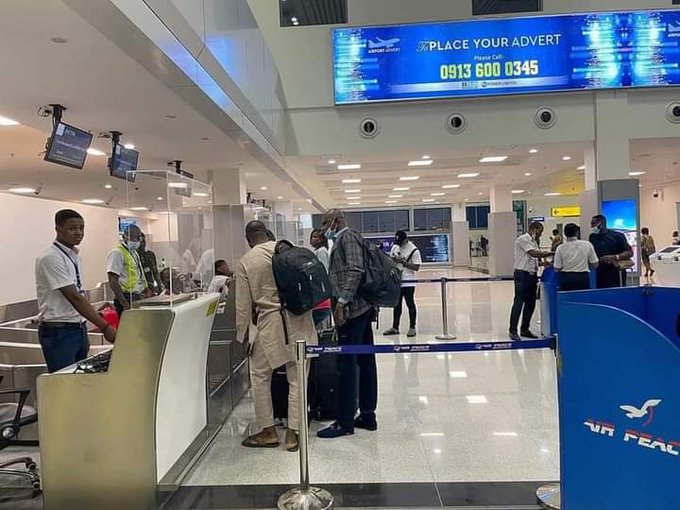The Nigeria Civil Aviation Authority (NCAA) has initiated enforcement actions against five airline operators for various regulatory breaches. The affected airlines, which include both international and domestic carriers, are under scrutiny for their failure to adhere to Part 19 of NCAA’s regulations, dealing with flight disruptions, customer service, and compensation rules. However, the Authority did not name the airlines.
Speaking at a press briefing in Abuja on Tuesday, Michael Achimugu, the Director of Public Affairs and Consumer Protection at the NCAA, stated that the aviation regulatory body had been left with no choice but to impose sanctions on the airlines due to their repeated non-compliance. Achimugu outlined the nature of the violations, which range from the non-payment of refunds within the legally stipulated timeframe, to mishandling luggage, flight cancellations, and delayed services.
“While it is recognized that not all flight disruptions are within the control of airlines, NCAA regulations are clear about what actions airlines must take when disruptions occur,” Achimugu explained. “When airlines fail to act in accordance with these rules, they risk facing significant penalties.”
The violations come as Nigerian passengers are increasingly frustrated with the state of air travel in the country, especially during the peak Yuletide period. According to Achimugu, passengers have lodged numerous complaints about delayed and canceled flights, with several citing long delays before receiving refunds or being informed of the status of their flights.
Refund Issues: A Recurrent Problem
One of the major grievances highlighted by Achimugu was the failure of airlines to process refunds within the prescribed 14-day window for online ticket purchases, or to provide immediate cash refunds for tickets purchased in person. This has become a recurring issue, with many passengers expressing their discontent over airlines’ slow response to refund requests.
“Although airlines are not always responsible for flight disruptions, the NCAA has specific regulations that require airlines to address passenger concerns in a timely and efficient manner,” Achimugu emphasized. “We’ve issued several warnings, but it appears that some operators still prefer to disregard these obligations.”
In an attempt to resolve these issues, the NCAA has been forced to take a more active role in holding airlines accountable for non-compliance. Achimugu revealed that the enforcement actions currently being taken are aimed at ensuring airlines meet their regulatory responsibilities, with more actions expected in the coming weeks.
Seasonal Flight Disruptions and Force Majeure
The Yuletide period, which sees a surge in air travel, has brought the issue of flight delays and cancellations into sharp focus. Achimugu acknowledged that while weather conditions such as the harmattan season contribute to reduced visibility and frequent flight cancellations, airlines must still meet certain obligations even during these disruptions.
“Flight cancellations due to force majeure events like poor visibility or adverse weather conditions are understandable and do not necessarily require airlines to compensate passengers,” he clarified. “However, when the disruptions are caused by the airlines’ own negligence or failure to follow proper procedures, we will not hesitate to enforce sanctions.”
The harmattan season, which is notorious for its dense fog and low visibility, has been cited by airlines as a key reason for many flight cancellations and delays during this time of year. However, Achimugu was firm in stating that the NCAA would not accept excuses from operators who fail to meet their regulatory obligations in such situations.
“We will investigate all cases of non-compliance, especially in instances where the airlines themselves are at fault,” Achimugu stated. “We are not blind to the challenges posed by the harmattan season, but airlines are still expected to follow the rules and ensure that their passengers’ rights are upheld.”
More Sanctions Expected
The NCAA’s warning is clear: more sanctions are likely to follow if airlines do not take proactive measures to improve their operations. Achimugu confirmed that the regulatory body will soon summon the Chief Executive Officers (CEOs) of the affected airlines for a high-level meeting to address ongoing concerns about flight disruptions and customer service breaches.
“These meetings will be essential in helping us understand the challenges airlines face and in finding long-term solutions to improve the industry,” he stated. “We want to ensure that these issues are not repeated, and that Nigerian passengers can enjoy safe and reliable air travel.”
The NCAA’s move to hold airlines accountable is part of a broader effort to improve aviation standards in Nigeria. Over the years, the aviation industry has faced criticism over its lack of effective regulation and enforcement, which has often led to poor passenger experiences and growing discontent with air travel in the country.

